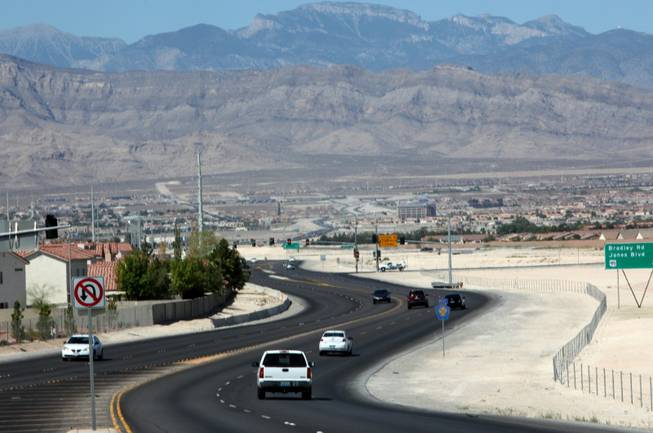
Parts of the Las Vegas Beltway fall short of freeway standards, like this photo taken along its northern stretch where it intersects with Decatur Boulevard. Controversy has surrounded the County Commission’s 5-2 vote on July 21, 2009, to award the upgrade project to Las Vegas Paving, whose bid was $4.6 million more expensive than competitor Fisher Sand and Gravel.
Tuesday, June 28, 2011 | 2:01 a.m.
Sun Archives
- Bidder challenges county’s decision to appeal Beltway ruling (2-3-2010)
- Divided county commission votes to appeal Beltway ruling (2-2-2010)
- County caught playing favorites (1-9-2010)
- Judge orders county to award contract in beltway construction project (1-5-2009)
- County rejects 215 Beltway bids, will start from scratch (11-17-2009)
- Judge denies request to block vote on Beltway project (11-16-2009)
- Judge’s dismissal of 215 Beltway suit paves way for vote (11-3-2009)
- Collins sues county, contractors over alleged ‘secret agreement’ (10-6-2009)
- Law experts baffled by looming deal with paver (9-18-2009)
- 215 Beltway project may be headed for deadlock (9-1-2009)
- Commission to review 215 Beltway bid again, minus two members (8-25-2009)
- Paver learns its skeletons cost it a 215 Beltway job, not record (8-14-2009)
- Judge halts work on 215 Beltway project (8-5-2009)
A two-year legal dispute between Clark County and Fisher Sand & Gravel over a $120 million project to widen the Beltway in the northwest valley is being resolved, sources said.
A deal has been struck that will award the project to the original bid-winner, Las Vegas Paving, the sources said. In turn, Fisher Sand & Gravel, which submitted the low bid and alleged Clark County commissioners were biased against the nonunion company after the contract went to Las Vegas Paving, will be paid about $5 million. Some of that will come from interest earned on the estimated $120 million held in escrow for two years as the legal battle dragged on, with the rest coming from Las Vegas Paving.
The exact settlement amounts were not available.
Sources said the deal could come before the County Commission as early as its next regular meeting July 5. It’s likely the commission will approve the agreement, since commissioners two years ago twice voted to hire Las Vegas Paving even though its bid was $4.5 million higher than Fisher’s. Commissioners agreed with Las Vegas Paving’s argument that Fisher’s subcontractors weren’t properly licensed.
The widening of the Beltway between Decatur Boulevard and Tenaya Way is expected to create 200 jobs.
In a June 2009 decision, a District Court judge ruled Las Vegas Paving hadn’t filed a protest to Fisher’s bid in time, and ordered commissioners to vote again. But during debate before the second vote, Commissioner Steve Sisolak played a videotape of a Phoenix television newscast that said Fisher’s asphalt plant had collected more than 1,000 emissions violations. Sisolak also brought up a child pornography charge against a former Fisher Industries executive to bolster his argument that it was not a “responsible bidder.”
Fisher’s attorney, Stan Parry, accused commissioners of a bias toward union companies since Las Vegas Paving’s crews are union but Fisher’s are not.
Fisher then sued in U.S. District Court, alleging such bias. In his August decision, federal Judge Robert Jones ordered yet another vote to give Fisher the chance to address the accusations. Also, the judge signed a writ forbidding Commissioners Sisolak and Tom Collins, “by willing agreement,” to vote on the matter.
Collins sued, saying county and Fisher attorneys made that agreement without his say-so. Collins lawsuit landed in Jones’ court. The judge dismissed it in November 2009.
That didn’t matter two weeks later, when the other five commissioners voted to reject all bids for the project. Instead they voted to use the money for smaller improvements on the Las Vegas Beltway.
It was that move that probably saved the project for Las Vegas Paving, because of all the legal wrangling that followed. In January, Jones went a step further and ordered the county to give the project to Fisher Sand & Gravel. During a hearing, Jones characterized commissioners of acting “corruptly.”
In response, the county appealed to the 9th U.S. Circuit Court of Appeals. More than a year later in April, the court heard oral arguments. One judge expressed surprise at Jones’ forcing the county to give the project to Fisher, calling it a “pretty large degree of federal intervention in a local matter.”
Another judge suggested, however, that commissioners should have followed the judge’s order and voted again instead of dismissing all of the bids.
Since then, attorneys for all the parties worked with federal mediators, sources said, and a deal resulted.
And since the original lawsuit, more has come out of the environmental allegations against Fisher in Arizona. In answer to 80 air-and-water quality violations chalked up over four years, Fisher and Southwest Asphalt, its subsidiary, came to an April agreement with the Arizona Environmental Quality Department and the state’s attorney general to pay $125,000 in penalties.
Before that agreement, Fisher paid a $1 million settlement to Maricopa County that took care of some 1,300 air-quality violations. Then in 2010, it paid $243,000 in fines, donated $50,000 to nonprofit organizations, and dismantled an illegally built asphalt plant in Phoenix.

Join the Discussion:
Check this out for a full explanation of our conversion to the LiveFyre commenting system and instructions on how to sign up for an account.
Full comments policy